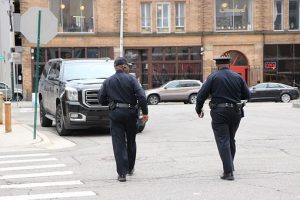The State and Federal Constitutions require that when the government takes action against someone that person must receive due process. For Civil Service employees, that process is the disciplinary appeals process. Therefore, in the case of In re Smith, Irvington Township, Department of Public Safety, the Appellate Division ruled that an administrative law judge and the Civil Service Commission could not rely on fact findings in a related but separate criminal trial. This is an  important New Jersey employment law decision, because to meet the constitutional requirements of due process and fundamental fairness, the New Jersey Civil Service disciplinary appeals process must give a meaningful hearing to effected civil service employees.
important New Jersey employment law decision, because to meet the constitutional requirements of due process and fundamental fairness, the New Jersey Civil Service disciplinary appeals process must give a meaningful hearing to effected civil service employees.
Monique Smith was a career officer with the Irvington Police Department. On the day that she was promoted to captain, her boyfriend broke up with her by email. Captain Smith went to his apartment after the ceremony, and followed him when she saw him leaving in his car. Smith admitted driving over a center island during her drive. Smith was charged with eight traffic violations for this drive, including leaving the scene of an accident and reckless driving. The Department suspended Smith because of the charges. Based on this incident, Smith was also criminally charged with second degree aggravated assault, fourth degree unlawful possession of a weapon, third degree possession of a weapon for unlawful purposes, and fourth degree criminal mischief. The aggravated assault was dismissed by the State, and the criminal mischief charge was amended to a disorderly persons offense (a misdemeanor). A jury found Captain Smith not guilty of all the charges. The trial judge also heard the traffic offenses and found Smith guilty of reckless driving.
Prior to the decision, administrative disciplinary charges were filed against Smith for conduct unbecoming a public employee and five other violations stemming from the same conduct. A departmental disciplinary hearing was held and a six month working day suspension without pay was imposed. Smith appealed to the New Jersey Civil Service Commission. The Commission referred the matter to the Office of Administrative Law (the “OAL”) as a contested case. An administrative law judge (“ALJ”) held a two day hearing. The ALJ issued a recommended decision that the charges be upheld but that the penalty be reduced to a ninety day suspension. The ALJ also recommended that Irvington pay half of Smith’s attorneys fees as she was the prevailing party. However, the ALJ based her findings not on the evidence produced at the hearing, but rather wholly on the evidence and findings of fact from the criminal trial. Despite Smith’s exceptions, the Commission adopted the ALJ’s recommended decision, except that the ninety days would be ninety working days and it rejected the award of attorneys fees.
 “Commission”). The Commission is a department of the executive branch of the New Jersey State Government. Administratively it is part of the New Jersey Department of Labor and Workforce Development. Nonetheless, it operates as an independent agency. It is free from control of the Department of Labor and Workforce Development.
“Commission”). The Commission is a department of the executive branch of the New Jersey State Government. Administratively it is part of the New Jersey Department of Labor and Workforce Development. Nonetheless, it operates as an independent agency. It is free from control of the Department of Labor and Workforce Development. New Jersey Lawyers Blog
New Jersey Lawyers Blog


 case of
case of 
 important New Jersey employment law decision, because to meet the constitutional requirements of due process and fundamental fairness, the New Jersey Civil Service
important New Jersey employment law decision, because to meet the constitutional requirements of due process and fundamental fairness, the New Jersey Civil Service  employees the ability to appeal most employer imposed discipline to the New Jersey Civil Service Commission.
employees the ability to appeal most employer imposed discipline to the New Jersey Civil Service Commission.
